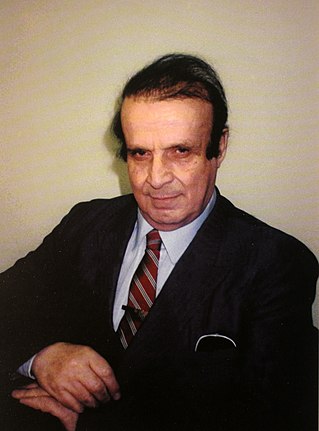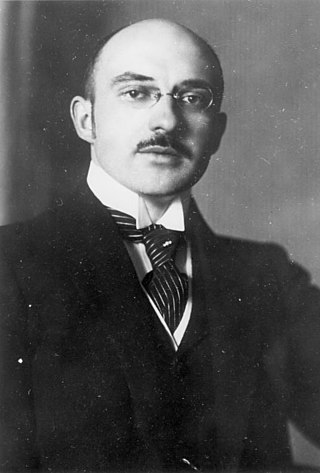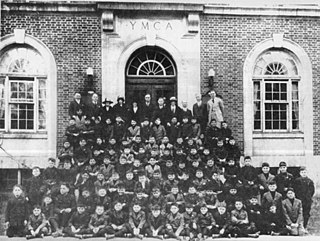Related Research Articles

Raphael Lemkin was a Polish lawyer of Jewish descent who is known for coining the term genocide and campaigning to establish the Genocide Convention. During the Second World War, he campaigned vigorously to raise international outrage against atrocities in Axis-occupied Europe. It was during this time that Lemkin coined the term "genocide" to describe Nazi Germany's extermination policies against Jews and Poles.

Vahakn Norair Dadrian was an Armenian-American sociologist and historian, born in Turkey, professor of sociology, historian, and an expert on the Armenian genocide.

The International Association of Genocide Scholars (IAGS) is an international non-partisan organization that seeks to further research and teaching about the nature, causes, and consequences of genocide, including the Armenian genocide, the Holocaust, the genocides in Cambodia, Rwanda, Burundi, Bosnia-Herzogovina, Bangladesh, Sudan, and other nations. The IAGS also advances policy studies on the prevention of genocide. The association's members consider comparative research, case studies, links between genocide and other human rights violations, predictive models for prevention of genocide, and tribunals and courts for the punishment of genocide. The organization's membership includes academics, anti-genocide activists, artists, genocide survivors, journalists, jurists, and public policy makers. Membership is open to interested persons worldwide.

Ludwig Maximilian Erwin von Scheubner-Richter was a Baltic German political activist and an influential early member of the Nazi Party.
Armenian revolutionary songs are songs that promote Armenian patriotism. The origins of these songs lay largely in the late nineteenth and early twentieth centuries, when Armenian political parties were established to struggle for the political and civil rights of Armenians living in the Ottoman Empire.

Armenian genocide denial is the claim that the Ottoman Empire and its ruling party, the Committee of Union and Progress (CUP), did not commit genocide against its Armenian citizens during World War I—a crime documented in a large body of evidence and affirmed by the vast majority of scholars. The perpetrators denied the genocide as they carried it out, claiming that Armenians in the Ottoman Empire were resettled for military reasons, not exterminated. In the genocide's aftermath, incriminating documents were systematically destroyed, and denial has been the policy of every government of the Republic of Turkey, as of 2023, and later adopted by the Republic of Azerbaijan, as of 1991.

Ottoman labour battalions was a form of unfree labour in the late Ottoman Empire. The term is associated with the disarmament and murder of Ottoman Armenian soldiers during World War I, of Ottoman Greeks during the Greek genocide in the Ottoman Empire and also during the Turkish War of Independence.
Yair Auron is an Israeli historian, scholar and expert specializing in Holocaust and genocide studies, racism and contemporary Jewry. Since 2005, he has served as the head of the Department of Sociology, Political Science and Communication of The Open University of Israel and an associate professor.

The Georgetown Boys, or Canada's Noble Experiment, was the first humanitarian act on an international scale by the country. This effort was spearheaded by the Armenian Relief Association of Canada. At this time Canada started to take in orphaned children from the Middle East. The first 50 came in 1923. The following year another 40 boys came. The boys came to Canada from the Middle East after they had been orphaned during the Armenian genocide. By the end of the project, a total of 110 came to Georgetown, Ontario, and eventually came to be called the Georgetown Boys.

Gerard Jirair Libaridian is an Armenian American historian and politician.
Levon Marashlian is an American historian, professor, and scholar. His scholarly work has largely focused on Armenian, Russian, and Middle-Eastern history. He has participated in various debates, lectures, and conferences throughout the world. He is currently a professor of history at Glendale Community College.
Levon Chorbajian is an American sociologist. He is a professor at the University of Massachusetts Lowell. He is the Director of the US section of the Zoryan Institute for Contemporary Armenian Research and Documentation.

Frank E. Sysyn is an American historian of Ukrainian origin. His grandmother was from Ukraine.
Salpi Haroutinian Ghazarian, is the current director of the University of Southern California's Institute of Armenian Studies.

Holocaust education is efforts, in either formal or informal settings, to teach about the Holocaust. Teaching and Learning about the Holocaust addresses didactics and learning, under the larger umbrella of education about the Holocaust, which also comprises curricula and textbooks studies. The expression "Teaching and Learning about the Holocaust" is used by the International Holocaust Remembrance Alliance.

The late Ottoman genocides is a historiographical theory which sees the concurrent Armenian, Greek, and Assyrian genocides that occurred during the 1910s–1920s as parts of a single event rather than separate events, which were initiated by the Young Turks. Although some sources, including The Thirty-Year Genocide (2019) written by the historians Benny Morris and Dror Ze'evi, characterize this event as a genocide of Christians, others such as those written by the historians Dominik J. Schaller and Jürgen Zimmerer contend that such an approach "ignores the Young Turks' massive violence against non-Christians", in particular against Muslim Kurds.
A Shameful Act: The Armenian Genocide and the Question of Turkish Responsibility is a 1999 book by Taner Akçam about Armenian genocide denial, originally published in Turkish. Paul Bessemer translated content from the original Turkish for the 2006 English translation, and Zoryan Institute members Julie Gilmour and George Shirinian revised the raw translation.
Bibliography of the Armenian genocide is a list of books about the Armenian genocide:

The relationship between the Armenian genocide and the Holocaust has been discussed by scholars. There are scholars who see a direct causal relationship between the Armenian genocide and the Holocaust, however, some do not believe that there is a direct causal relationship between the two.
Hilmar Kaiser is a German historian who has a PhD from European University Institute, Florence, and works at Yerevan State University.
References
- ↑ Schaller, Dominik J. (2007). "From the Editors: Judges and Politicians as Historians?". Journal of Genocide Research. 9 (1): 1–4. doi: 10.1080/14623520601162881 . S2CID 71844425.
- ↑ "About Us". Zoryan Institute. Retrieved May 19, 2019.
- ↑ "Home". International Institute for Genocide and Human Rights Studies. Retrieved May 19, 2019.
- ↑ "Our Work". Zoryan Institute. Retrieved May 19, 2019.